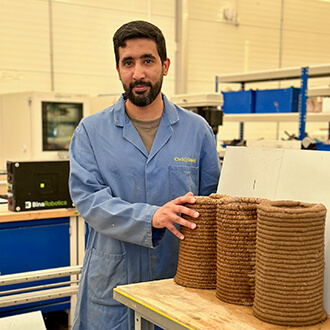Overview
As concerns over climate change and energy independence grow, the drive towards reducing energy consumption through energy-efficient building is intensifying.
Brunel’s Building Services Engineering with Sustainable Energy MSc gives graduates interested in environmentally responsible buildings the knowledge and skills to apply renewable and sustainable energy technologies to the design, construction and operations of interior environments.
As with our Building Services Engineering MSc, you'll get a solid grounding in the core subjects of heat transfer, energy conversion, acoustics, electrical services and lighting design, as well as in the practicalities of building management, fire and smoke control, waste disposal and lifts and escalators.
On top of this, you’ll gain a thorough understanding of key sustainability issues such as renewable energy technologies, including its generation, storage and economic and environmental impacts, energy-efficient ventilation, and air conditioning.
You can study part-time over three years via our distance learning programme.
This course is accredited by the Institution of Mechanical Engineers (IMechE), the Chartered Institution of Building Services Engineers (CIBSE) and the Energy Institute (EI), which means your degree will put you on course to gain Chartered Engineer (CEng) status in the UK.
Throughout your studies you’ll have use of our state-of-the-art laboratory facilities and 24-hour access to industry standard specialist software for engineering design at dedicated computer clusters on campus, so you’ll have the opportunity and equipment to explore ideas and tackle problems.
In an era where sustainable, low-to-zero emission buildings are a goal of the construction industry, demand for job candidates with the skills to design and manage energy-efficient building projects is on the rise. Your Brunel engineering master's will give you these and stand you in good stead for a range of rewarding jobs.
You can explore our campus and facilities for yourself by taking our virtual tour.
Course content
The course aims to give graduates the technical and managerial training they need to pursue careers in business services engineering, with a focus on sustainable design.
Work for your business services engineering with sustainable energy degree consists of compulsory modules and a 15,000-word dissertation.
Compulsory
- ME5506 - Energy Conversion Technologies
- Demonstrate comprehensive knowledge and understanding of the advanced principles and practice of modern energy conversion technologies
- Demonstrate comprehensive knowledge and understanding of the processes for local energy conversion and utilisation in buildings.
- Systematically evaluate the appropriate techniques for the solution of engineering problems in this field, analyse, apply complex mathematical or technical solutions and physical principles.
- Electrical Services and Lighting DesignThis module aims to provide the essential appreciation and understanding of electrical services design in building services applications, with particular reference to safety requirements, and to explain and illustrate the principles of lighting design in building services applications.
- Building Heat Transfer and Air ConditioningThis module aims to familiarise the students with principles of heat transfer, to develop the principles of building heat transfer, to examine the dynamic thermal behaviour of buildings, to reinforce and apply the principles of psychrometrics, and to provide an overview of the characteristics of air conditioning systems, design requirements and criteria for system selection.
- Acoustics, Fire, Lifts and DrainageThis module aims to introduce the design principles of noise control, fire safety, public health and vertical transportation in buildings.
- Building Services Design and ManagementThis module aims to provide experience in the evaluation of building internal environment and the effect of building services design solutions, to introduce the principles and expose students to the practice of engineering services design for buildings, and to develop an understanding of the way in which assets are managed within business.
- Renewable Energy TechnologiesThis module aims to consider principles of the main renewable resources, and to provide a solid and quantitative understanding of renewable energy technologies.
- Energy Efficient Ventilation for BuildingsThis module aims to consider current regulations on energy efficiency in buildings in relation to natural, hybrid and mechanical ventilation, to provide the essential appreciation and understanding of energy efficient ventilation strategies and systems for buildings, and to explain and illustrate the principles of energy efficient ventilation services applications.
- DissertationThe dissertation aims for students to complete and report on a soundly executed and constructed programme of investigation, analysis and research containing original work.
This course can be studied undefined undefined, starting in undefined.
Please note that all modules are subject to change.
Read more about the structure of postgraduate degrees at Brunel
Careers and your future
Our graduates work in building services and construction-related consultancies such as Hoare Lea, Arup, BuroHappold, AECOM, Cundall, BRE, ChapmanBDSP, Atkins, WSP Group, Faber Maunsell and Hilson Moran.
Other employers include county councils within their building management and environmental departments, EDF Energy, Skanska, Trend Control Systems and Honeywell Control Systems.
You can also progress to academic research.
UK entry requirements
A 2:2 (or above) UK Honours degree or equivalent internationally recognised qualification in Mechanical, Building Services or technology subject. Other qualifications and relevant experience will be assessed on an individual basis.
Entry to this programme requires all students who are not nationals of the European Economic Area (EEA) and have temporary immigration permission to remain in the UK to obtain an ATAS certificate. If you are made an offer to join this course and you are not an EEA national, you will be required to obtain an ATAS certificate as a condition of your offer.
Applicants who will need an Academic Technology Approval Scheme (ATAS) Certificate. To find out if you will need an ATAS certificate, please visit this webpage: https://www.gov.uk/guidance/find-out-if-you-require-an-atas-certificate#when-you-need-an-atas-certificate.
The deadline for Admissions to make offers to applicants who will require an ATAS certificate is 31st July 2026.
EU and International entry requirements
If you require a Tier 4 visa to study in the UK, you must prove knowledge of the English language so that we can issue you a Certificate of Acceptance for Study (CAS). To do this, you will need an IELTS for UKVI or Trinity SELT test pass gained from a test centre approved by UK Visas and Immigration (UKVI) and on the Secure English Language Testing (SELT) list. This must have been taken and passed within two years from the date the CAS is made.
English language requirements
- IELTS: 6 (min 5.5 in all areas)
- Pearson: 59 (59 in all sub scores)
- BrunELT: 58% (min 55% in all areas)
- TOEFL: 77 (min R18, L17, S20, W17)
You can find out more about the qualifications we accept on our English Language Requirements page.
Should you wish to take a pre-sessional English course to improve your English prior to starting your degree course, you must sit the test at an approved SELT provider for the same reason. We offer our own BrunELT English test and have pre-sessional English language courses for students who do not meet requirements or who wish to improve their English. You can find out more information on English courses and test options through our Brunel Language Centre.
Please check our Admissions pages for more information on other factors we use to assess applicants. This information is for guidance only and each application is assessed on a case-by-case basis. Entry requirements are subject to review, and may change.
Fees and funding
2025/26 entry
If you are a Distance Learning student, costs for 2025/26 are:
- £1200 per 15 credit module
More information on any additional course-related costs.
Fees quoted are per year and are subject to an annual increase.
See our fees and funding page for full details of postgraduate scholarships available to Brunel applicants.
Scholarships and bursaries
Teaching and learning
Distance Learning students
You are not required to be on campus. All study materials will be accessible from your current location providing you with the flexibility you need to complete your course.
All other students
To ensure you receive the maximum support and have the greatest opportunity to reach their full potential the expectation is that students enrolled on these programmes attend in-person all teaching activities including examinations that are scheduled on campus. This will be the majority of all activities. However, where for pedagogical reasons alternative methods of delivery are used for activities students will be notified and will be expected to engage with the activity at the time of delivery.
Laboratory Support
For modules with practical learning content, these will be delivered in-person on campus in the laboratories.
Assessment
Traditional examinations will be taken in-person on campus.
Access to specialist software
You will have access to relevant engineering software on campus. You are also able to install software on their own personal laptops and connect to the Brunel License server through a VPN connection. This provides continued access to all services.
Contingency
If for any reason there are access restrictions imposed on staff or students, alternative arrangements will be made and due notice given.
Access to a laptop or desktop PC is required for joining online activities, completing coursework and digital exams, and a minimum specification can be found here.
We have computers available across campus for your use and laptop loan schemes to support you through your studies. You can find out more here.
Our staff have national and international reputations for their research, publications and applied work. Many carry out their research in the fields of solid and fluid mechanics and energy and environment, and in collaboration with leading industrial firms and governmental laboratories. This means that your education will be at the forefront of scholarship and practice, covering the most up-to-date industry knowledge.
Your course will consist of combinations of lectures, seminars, tutorials, laboratory and practical sessions, coursework and group work.
Distance learning students are supplied with a study pack of text books and CD-ROMs.
MSc dissertation projects are normally carried out over one year for distance-learning students.
Our Building Services Engineering courses have been awarded the Happold Brilliant Award for teaching excellence by the Chartered Institution of Building Services Engineers.
Should you need any non-academic support during your time at Brunel, the Student Support and Welfare Team are here to help.
Modes of study
3 years distance learning
The self-study distance learning programme enables you to conduct most of your studies at home, in your own time and at your own pace.
You have up to three years to complete the course, with students taking four modules in the first year, three modules in the second year and writing their dissertation in the third year.
You should allow about twelve hours each week for study.
You can sit your examinations either at Brunel University or in the country where you are resident. We have an extensive network of organisations (universities, colleges and British Council offices) throughout the world that can provide invigilation services.
Assessment and feedback
Modules are assessed by combinations of formal examination and written assignments. Examinations are normally sat in May or June.
Successful completion of the taught modules allows you to proceed to the dissertation stage. To qualify for the award of the MSc degree, you must submit a satisfactory dissertation.
Read our guide on how to avoid plagiarism in your assessments at Brunel.



